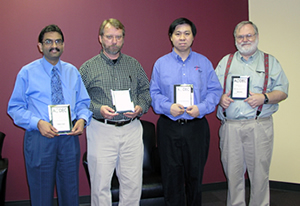|
A team of technology experts from OARnet has won the "Outstanding Contribution to Technological Infrastructure" award presented by the American Distance Education Consortium (ADEC) at a ceremony in New Orleans on April 27. OARnet is the networking division of the Ohio Supercomputer Center, a technology initiative of the Ohio Board of Regents. OSC's divisions include OARnet (Ohio Academic Resources Network), High Performance Computing (HPC), and the Third Frontier Network (TFN). OSC also runs various U.S. Department of Defense, Department of Education, National Science Foundation, and other national and federal lab projects. |
 |
The individuals recognized for the award include OARnet Director Pankaj Shah, OARnet Director of Networking Paul Schopis, OARnet and OSU Engineer Dr. Robert Dixon, and OARnet Engineer Weiping Mandrawa.
The team received the award for its breakthrough work in Voice over Internet Protocol (VoIP) in terrestrial and satellite networks.
"The idea is to provide the people in rural and underserved areas of the state with alternatives to dial-up connections. These remote locations often have expensive or faulty phone service," said Shah. "Voice over IP will provide a higher quality phone service through satellite links."
OARnet worked for more than six months to make Internet telephone service a reality. Currently, the backbone testing is complete and end site testing has begun, and should be completed by the fall. Shah said initial results using this technology in remote areas looks promising. Topics like security and 911 services were discussed as potential benefits to VoIP, however, these areas require further testing, Shah said.
The OARnet engineering team has combined its skills and knowledge of H.323 advanced multi-point Internet technology, satellites, and network infrastructure routing. H.323 Internet service is how OSC plans to provide phone service to previously areas that have previously been considered "inaccessible" locations. OARnet also provided the hardware and end-site testing plan to make this project possible.
"In the bigger picture, this project shows the support and the exposure that we have at a national level through agencies such as ADEC," said Shah. Our VoIP project will make a difference to users who are so remote to us that they have the potential to be forgotten, but our organization has worked hard to make sure that those users are represented as we conquer the digital divide."
OARnet has been successful in similar projects using the Internet as a communication tool for satellite Internet service in Southeastern Ohio. These projects are true success stories and are making a difference for Ohio's underserved and rural communities.